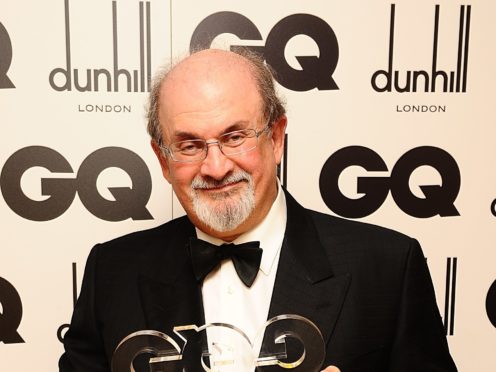The chairwoman of the judging panel for this year’s Women’s Prize For Fiction has hit back after author Sir Salman Rushdie called it “unnecessary”.
The award takes place on Wednesday night and celebrates “excellence, originality and accessibility in women’s writing from throughout the world”.
In 2017, the author of The Satanic Verses and Midnight’s Children had dismissed the prize as a “marketing tool”, telling the Press Association it puts female authors in a “ghetto”.
Today is THE DAY!We'll be #LIVE streaming the 2019 #WomensPrize winner's announcement via Periscope right here at 6.45pm. Set your alarms and tune in ⏰ pic.twitter.com/U2MWyLfdBm
— Women's Prize (@WomensPrize) June 5, 2019
Author Kate Williams, who is chairwoman of the judging panel and a professor of history, said a similar comment would not be made about a prize for male authors.
“It’s ridiculous, completely ridiculous, for someone of Salman’s intelligence to say that,” she told the Press Association.
“When the prize was set up there were a huge amount of books being published by women, but they weren’t being shortlisted or winning prizes.
“It’s not a ghetto. It’s a celebration of books by women.
“No-one would say, if there was a men’s prize, it was a ‘men’s ghetto’… They would say it was a book prize.”
Prof Williams said there are “still obstacles” for female writers.

“There is still sexism, still exclusion. Books by women are criticised or passed off as ‘women’s fiction’ or ‘romance fiction’ in a way that books by men just aren’t.
“A man writes a domestic, family or romance novel and it is seen as a big, important book about human values… a great, important novel.
“A woman writes one and it’s ‘formula fiction’. So there are still obstacles for the female writer.”
Winners of the title, previously known as the Baileys and Orange Prize, include Zadie Smith, Lionel Shriver, Ali Smith and Chimamanda Ngozi Adichie.
This year’s shortlist features The Silence Of The Girls by Pat Barker; My Sister, The Serial Killer by Oyinkan Braithwaite; Milkman by Anna Burns; Ordinary People by Diana Evans; An American Marriage by Tayari Jones; and Circe by Madeline Miller.
Speaking in October 2017, Booker Prize winner Sir Salman said: “I don’t like prizes that are just for one category only.
“I have my reservations about the… what is it now called? What used to be the Orange, the Baileys Prize… I just think there’s no need for women to be put in a ghetto.
“Try putting Doris Lessing or AS Byatt into a ghetto. They wouldn’t like it.
“My view is it’s not necessary,” he said, but added: “If it brings attention to a group of writers it’s fine.
“I think now what has happened is that it has just become like a marketing tool. It has become a way of helping to flog a few books and I think that’s fine.
“I don’t think women writers need protection like that, I think they’re perfectly able to take care of themselves in an open battle.”
The idea for the literary award, co-founded by best-selling author Kate Mosse, came when reviewers, agents, publishers and booksellers got together to discuss why women appeared to be overlooked for major prizes despite publishing more books than men at the time.
The Booker Prize had just announced its shortlist, in 1991, with no women on it at all.
Prof Williams said: “Men have been reading the books and thinking about the books. It’s not something that excludes men.”
And she added: “They could have a men’s prize if they wanted. Why not?”
